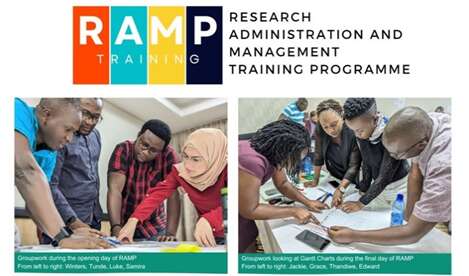
Training administrators, managers, and finance officers: A conversation with Talib and Mary
In today’s blog we talk to Abu Talib Deen from the Institute for Development (IfD) in Sierra Leone part of the ReBUILD for Resilience Consortium and Mary Asorit from the African Institute for Development Policy (AFIDEP) in Kenya part of the IMPALA and LIGHT Consortium. They both attended the Research Administration & Management Programme (RAMP) in Mombasa from 5th to 10th June 2023. This training was organised by the LIGHT Consortium and the IMPALA Programme and focused on equipping research support staff with knowledge and tools to better manage externally funded grants. The training covered topics on administration, project management, and finance.
Talib has a background in Information Technology and has worked as an Administrator and Human Resources Officer for over twelve years. Being passionate about making a positive change in people's lives, Talib eagerly seized a working opportunity with IfD to do so.
Mary is the Grants' Accountant at the African Institute for Development Policy (AFIDEP) and has worked for various research- based non-profit organisations for ten years. She joined AFIDEP as she was interested in working for a research organisation dealing with health and well-being.
In this conversation, we will hear more from them and what they thought about the training.
Martina: Thank you both for joining this discussion today. Let's start with a rapid-fire question: if you had to describe RAMP in three words, what would you say?
Mary: "Impactful", "engaging", and "insightful".
Talib: "Educative”, “informative” and “transformative".
Martina: Can you further explain why you chose these words?
Mary: For me, it was a particularly insightful experience, especially in helping us reflect on the need to communicate with external funders about the challenges that may arise during project implementation. This helps in keeping them aware and, consequently, allow for flexibility with deliverables and timelines. I also liked the engaging style of the training, which gave us a great opportunity to network and share experiences with colleagues from other organisations relating to day-to-day administration, finance, project management, communication and much more.
Talib: RAMP was a transformative experience in the sense that it gave me knowledge, skills, and connections that have already begun to impact my professional life positively. Let me explain: my day-to-day responsibilities include managing tasks assigned to me by our Institue's Managing Director. I organise digital files, schedule meetings, and provide general support to the team. All these topics were effectively addressed during the RAMP training providing best practices which I am already applying in my job.
Martina: It sounds like sharing best practices with colleagues and effective communication are crucial aspects for successfully supporting a research team. Do you think there are any particular challenges that administrators, managers, and finance officers working on externally funded grants find nowadays?
Talib: Yes, defintely. Administrators, Managers, and Finance Officers handling externally funded grants face challenges in compliance, budget management, grant proposals, and stakeholders’ coordination. Navigating complex regulations and evolving funding guidelines is essential. Coordinating stakeholders, evolving funding landscape and mitigating project risks are additional challenges they must navigate.
Mary: The major challenges are unforeseen project activities coming up that lead to budget changes, especially when such activities were not in the project work plan. We also have to contend with the risk of projects being discontinued due to a change of scope, as well as high inflation due to economic factors that affect the budget. Natural disasters and pandemics, as we have recently witnessed with COVID-19, can have an impact on project implementation and consequently on the budget and time needed to complete the project.
Martina: Do you think RAMP addressed some of these challenges? And if not, how can it be improved?
Mary: Yes, RAMP did tackle most of these challenges.We learned about the triple constraints of time, cost, and scope and how to handle changes in each. We learned that requests for change in scope don’t always have to be accepted if there are no considerations on costs and time. And we also discussed ways to deal with issues such as inflation. In a nutshell, it gave us new ideas on how to tackle the day-to-day challenges we face in project administration, finance and management.
Talib: Yes, the RAMP training effectively addresses most of these issues by providing best practices and knowledge which I can now share with staff and colleagues at the research organisation where I’m working (IfD).
Martina: And one final question before closing, would you recommend the RAMP training to your colleagues or other professionals in Administration / Finance / Management and why?
Talib: Yes, I would recommend this training especially to my colleagues in finance as the RAMP training provided tips on effective budget allocation and monitoring which are crucial when developing compelling proposals and preparing accurate reporting.
Mary: I would definitely recommend the training as it offers an opportunity to learn and share with other professionals who have been through similar experiences.
